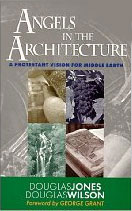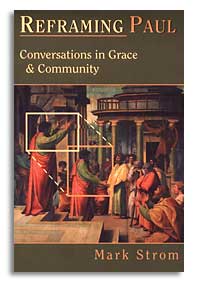Apr
10
2009
It’s time to reacquaint ourselves with Christ the man. Read your Bible. He’s there! Think of His physical power – a carpenter who worked long days with physical tools. He had “the voice and manner of a leader – the personal magnetism that begets loyalty and commands respect.” Christ plows through the gospels like a wrecking ball, smashing tables, driving people with a whip, devastating the Pharisees with a word, taming the winds with an uplifted hand, toppling a detachment of armed soldiers simply by speaking His name. He never cajoles; He commands! Christ is powerful, dangerous and unpredictable. Teachers, present Christ the man. Men will follow.
David Murrow, Why Men Hate Going to Church, p. 183
Comments Off | tags: David Murrow, Masculinity | posted in Christian Life, Ethics
Apr
9
2009
“Blessed are ye that weep now: for ye shall laugh” (Luke 6:21b).
 The truth of the gospel leads inexorably to laughter. Those who want to glower as they cling to truth want something that can never be. Whatever it is they have in their hands, it must not be the truth, unless it is just a fragment of it. The dour Calvinist, the cranky sabbatarian, and the pious self-loather are all textbook head cases. We see them in Scripture, we see them in our literature, and sometimes we see them out on their front porch on sabbath afternoons, glaring at the bicyclists. Are they speaking the truth? Well … are they laughing for joy?
The truth of the gospel leads inexorably to laughter. Those who want to glower as they cling to truth want something that can never be. Whatever it is they have in their hands, it must not be the truth, unless it is just a fragment of it. The dour Calvinist, the cranky sabbatarian, and the pious self-loather are all textbook head cases. We see them in Scripture, we see them in our literature, and sometimes we see them out on their front porch on sabbath afternoons, glaring at the bicyclists. Are they speaking the truth? Well … are they laughing for joy?
Whenever the truth is presented to us, we have to recognise the various devices we have for avoiding it. The libertine is not hard to understsand. Any given truth may be overtly rejected in the flesh. But we too often forget that it may also be accepted and praised in the flesh. Thus the pharisaical mind is innoculated to truth — he has received just enough of the truth to keep him from getting a case of the real thing.
- Douglas Jones, Douglas Wilson, Angels In The Architecture, p. 72-73.
Comments Off | tags: Devotion, Doug Jones, Doug Wilson | posted in Ethics
Apr
8
2009
In Hebrew, vindication and redemption are one word. When Job was confident that his redeemer lived, he was looking forward to his vindication against his “comforters.”
Jesus’ words against the Temple hung over Jerusalem for a generation, and would be vindicated despite Herod’s obsessive glorification of his graven image. Its completion in AD64 was taken as proof that Jesus was indeed a false prophet.
Christ came in judgment as He promised and the Temple was destroyed. Vindication and redemption came in one event, and new worship would be born through the death of the old.
“The pagan view of law is that justice is a balancing of the scales. The biblical view of law is that justice is transformational.”1
The death and resurrection of Israel in Christ as the head would be measured out in the people of God as the body. God’s Word brings division that leads totransfiguration. His justice always has one eye on the future.
1 James B. Jordan, Preterism vs. Gnosticism [lecture]. Available from www.wordmp3.com
Comments Off | tags: James Jordan, Job, Justice, Temple, Vindication | posted in Biblical Theology, Ethics
Apr
8
2009
 “We so often lead lives forgetful of the fact that our God is very shocking. Amidst all our fragile piety and devouring busyness, we have a Lord who steps in and commands us such things as, “Thou shalt bestow that money for whatsoever thy soul lusteth after, for oxen, or for sheep, or for wine, or for strong drink, or for whatsoever they soul desireth: and thou shalt eat there before the Lord thy God, and thou shalt rejoice, thou and thine household” (Deut. 14:26). Such unthriftiness. Such waste. Such gluttony. Such winebibbing. Such is a command of our holy God.
“We so often lead lives forgetful of the fact that our God is very shocking. Amidst all our fragile piety and devouring busyness, we have a Lord who steps in and commands us such things as, “Thou shalt bestow that money for whatsoever thy soul lusteth after, for oxen, or for sheep, or for wine, or for strong drink, or for whatsoever they soul desireth: and thou shalt eat there before the Lord thy God, and thou shalt rejoice, thou and thine household” (Deut. 14:26). Such unthriftiness. Such waste. Such gluttony. Such winebibbing. Such is a command of our holy God.
For some reason foreign to our modern ears, God tells us that celebration is central to pleasing Him; it is central to leading a good life. Modern American life has no time for serious celebrations as did life in centuries past. We’ve got work to do; projects and deadlines press us. And yet for all our industrial-strength pragmatism, few if any truly important things get accomplished. We have forgotten that celebration isn’t just an option; it’s a call to full Christian living.
Celebration is worshipping God with our bodies, with the material creation He has set up around us. Celebrating–whether in feasts, ceremonies, holidays, formal worship, or lovemaking–are all part of obeying God’s command to “love the Lord thy God with all thine heart”… God’s redemption and creation ought to keep us in a perpetual state of thanks which bursts out in celebration at every opportunity.”
- Douglas Jones, Douglas Wilson, Angels In The Architecture, p. 80.
Comments Off | tags: Devotion, Doug Jones, Doug Wilson | posted in Ethics
Apr
8
2009
Adam Smith was a true son of Adam when he wrote these famous words in Chapter 2 of The Wealth of Nations (1776).
But man has almost constant occasion for the help of his brethren, and it is in vain for him to expect it from their benevolence only. He will be more likely to prevail if he can interest their self-love in his favour, and show them that it is for their own advantage to do for him what he requires of them. Whoever offers to another a bargain of any kind, proposes to do this. Give me that which I want, and you shall have this which you want, is the meaning of every such offer; and it is in this manner that we obtain from one another the far greater part of those good offices which we stand in need of. It is not from the benevolence of the butcher, the brewer, or the baker that we expect our dinner, but from their regard to their own interest. We address ourselves, not to their humanity but to their self-love, and never talk to them of our own necessities but of their advantages.
The motivation here is clear: “More for me in history.”
Continue reading
Comments Off | tags: Dominion Theology, Economics, Gary North, Grace | posted in Ethics
Apr
8
2009

“…think of Simon Magus in Acts 8:9-25, who thought he could merchandise the power of the Holy Spirit. His sin was trying to use the power of God for his own ends. This is the sign of all false religion, but it is exactly this mentality that has come over so much of Christianity in our day.
Power can be an extremely destructive thing in any context, but religious power can destroy in a way that no other power can. When we are convinced that what we are doing is identical with the kingdom of God, anyone who opposes us must be wrong. When we are convinced that we always use our power to good ends, we believe we can never do wrong. And those who are accountable to no one are especially susceptible to the corrupting influence of power. In the sixth century, Saint Benedict established the ‘rule of stability’ to draw into encouraging and disciplined fellowships the many wandering prophets and monks who had no one to hold them accountable for what they said or did. Most media preachers and itinerant evangelists today suffer from exactly the same lack of accountability.
What we must see is the wrongness of those who think they are always right. Jesus Christ alone is always right. The rest of us must recognise our own foibles and frailties and seek to learn from the correction of others. If we do not, power can take us down the path of the demonic.”
Adapted from Money, Sex & Power by Richard Foster
The full article is at http://www.bullartistry.com.au/pdf_bestill/050BeStill.pdf
Comments Off | posted in Ethics
Apr
8
2009
 “What’s gone wrong? How can the church be an attractive, relevant community of transforming grace and conversation?”
“What’s gone wrong? How can the church be an attractive, relevant community of transforming grace and conversation?”
Excerpts from Reframing Paul, by Mark Strom
“Grace is subversive. It undermines the ideals and standards of those of us who cannot tolerate weakness in others (or in ourselves). It undermines the pride of those of us who search out every vestige of unbiblical belief and practice. It undermines the presumption of those of us who preach the pure gospel to cure all ills. It undermines the safety of those of us who throw off the shackles of abusive and codependent relationships only to refuse grace to those who have hurt us. It undermines our need to find the ideal, the answer, the method, the cure. We are left with the weakness of grace-full conversation.
Grace leaves us with Jesus. Jesus leaves us with his Spirit. His Spirit draws us into conversation. The conversation opens us to the wonder and fragility of life. The Father who gave us life bids us live and converse in grace.”
Read more…
http://bullartistry.com.au/pdf_bestill/058BeStill.pdf
Comments Off | tags: Devotion, Grace, Mark Strom | posted in Ethics
Apr
8
2009
Many people felt that New Buildings was scarcely the place for a man of Chapman’s type to live in. In fact a good part of the congregation at Grosvenor Street would have found it difficult to live there in those days, for drunkenness, filth and poverty were evident in the alleys around.
One day a wealthy gentleman approached him with a most attractive proposition. A fine house, standing in its own grounds in the country… But the offer was courteously declined. “No,” said Chapman, “I must live where the poorest saint can visit me.”
One day Mr. Chapman had the pleasure of an unexpected visit from a relative, who evidently desired to know how he lived…
Continue reading
Comments Off | tags: Biography, Devotion | posted in Ethics
Apr
8
2009
“Individualism is the problem. Community is the solution.”
That’s what they are saying. First the philosophers, sociologists, political theorists, psychologists, and theologians were saying it. Now I hear pastors, church leaders, and impressionable young seminarians saying it. Individualism is what bedevils culture and church both; community is what will save them…
The Real Problem: Continue reading
Comments Off | tags: Culture | posted in Ethics
Apr
8
2009
There is a lot of truth in theonomy. But things have changed since the time of Moses. At that point, the church and state were basically one.
After the exile, things were different. The role of the Jews was to be priests within the Gentile state. They no longer had the right to administer capital punishment. When they witnessed faithfully, there was a Jew at the emperor’s right hand, steering the empire for God’s people and their stand for the truth.
Continue reading
Comments Off | tags: Abel, AD70, Daniel, Haman, Joseph, Mordecai, Theonomy, Witness | posted in Biblical Theology, Ethics




























